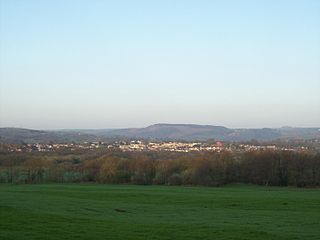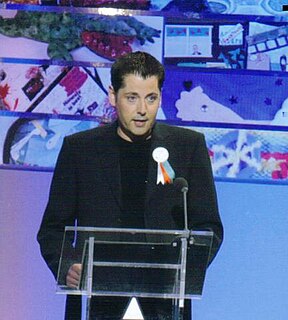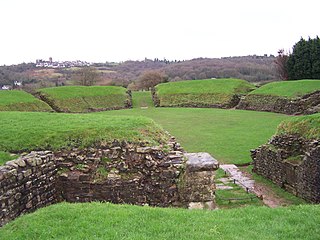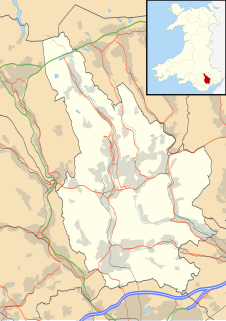The Rhymney Valley is one of the South Wales valleys. After the abolition of the counties of Glamorgan and Monmouthshire in 1974, Rhymney Valley was created as one of the districts of Mid Glamorgan. The valley encompasses the villages of Abertysswg, Fochriw, Pontlottyn, Tir-Phil, New Tredegar, Aberbargoed, Rhymney, Ystrad Mynach and Llanbradach, and the towns of Bargoed and Caerphilly.
This article is about the particular significance of the year 2005 to Wales and its people.
This article is about the particular significance of the year 1993 to Wales and its people.
This article is about the particular significance of the year 1958 to Wales and its people.

Nelson is a village and community in the County Borough of Caerphilly, Wales. It sits five miles north of Caerphilly and ten miles north of Cardiff, at the lower end of the Taff Bargoed Valley, and lies adjacent to Treharris, Trelewis and Quakers Yard.
Beriah Gwynfe Evans, was a journalist, Congregationalist, dramatist, Liberal politician and Welsh Nationalist.
Mark Lewis Jones is a Welsh actor, whose roles include that of a First Order Captain Moden Canady in Star Wars: The Last Jedi, a police inspector in BBC drama series 55 Degrees North, a whaler in the film Master and Commander: The Far Side of the World, soldier Tecton in Troy and Rob Morgan in the series Stella.

Rev. Rowland Williams, commonly known by his bardic name "Hwfa Môn", was a Welsh clergyman and poet, who served as Archdruid of the National Eisteddfod of Wales from 1895 to 1905.

Fochriw is a village located in Caerphilly County Borough, Wales. It was well known for its neighbouring collieries, which employed nearly the entire local population in the early 20th century. It lies within the historic county boundaries of Glamorgan. The village appears as the backdrop on the BBC Wales sitcom High Hopes credits.
This article is about the particular significance of the year 1893 to Wales and its people.
Urien Wiliam, was a Welsh language novelist and dramatist.

Paul Griffiths is a Welsh writer, theatre critic and director. He won the Drama Medal at the National Urdd Gobaith Cymru Eisteddfod three times in succession between 1995 and 1997 – the only person ever to do this. Between March 2006 and December 2013 he contributed a controversial weekly theatre column to the National Paper of Wales Y Cymro. He is also a regular contributor on the Welsh language Television Channel S4C and BBC Radio Cymru.

Iwan "Iwcs" Roberts is a Welsh actor, lyricist, poet, artist and singer. He has worked on various films, including the BAFTA-winning productions Eldra and Y Lleill, and is well known for his portrayal of character Kevin Powell in the Welsh soap opera Pobl y Cwm. He has also had a successful career as a singer-songwriter, both as part of the duo Iwcs a Doyle and as a solo artist.

The Urdd National Eisteddfod is an annual Welsh-language youth festival of literature, music and performing arts organised by Urdd Gobaith Cymru. Arguably Europe's largest youth festival, it is usually held during the last week of May, coinciding with schools' half term holiday. Locations alternate between north and south Wales. The Eisteddfod consists of competitive singing, recitation, art, composition, dance and instrumental events for contestants aged between 7 and 24 years. Regional qualifying heats are held in advance around Wales, as occurs for the National Eisteddfod.
Taliesin Williams was a Welsh poet and author, and son of notable literary forger Iolo Morganwg.

Theatre in Wales includes dramatic works in both the Welsh language and English language. Actors from Wales have also achieved international recognition.

William Williams was a Welsh Congregational minister, poet and literary critic born at Bryn y Ffynnon, Denbigh. He was one of the leading figures in the Welsh Eisteddfod movement and did much to raise the standards of Welsh literature of his time.

Elen Roger Jones was a Welsh actress and teacher.

















